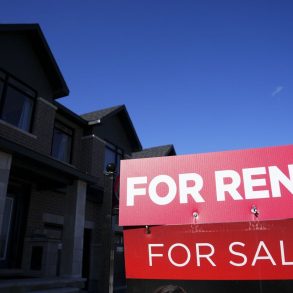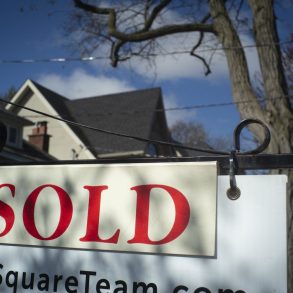The average asking rent in Canada continued to creep higher in January, reaching a new record high of nearly $2,200.
Average rent prices were up another 0.8% month-over-month, resulting in an annual gain of 10%, according to the latest report from Rentals.ca. Going back to pre-COVID levels, rents are now up by 20%, or an average of $373 a month.
Among different property types, purpose-built rental apartments saw the sharpest rise in prices, with asking rents up 13.5% over the past year to an average of $2,107 per month. In contrast, house rental prices were up 5.6% to $2,352 and condominium rentals saw a 4.1% increase to $2,372.
“…an underlying narrative has emerged between softening rents in expensive markets and strengthening rents in more affordable markets,” said Shaun Hildebrand, president of Urbanation and co-author of the report. “These shifts in demand are symptomatic of a worsening supply situation for rentals in Canada.”

A lack of available purpose-built rental apartments is a key reason for the upward pressure on rent prices, according to the 2024 Rental Market Report released several weeks ago by the Canada Mortgage and Housing Corporation.
The agency noted that the vacancy rate had fallen to a two-decade low of 1.5% in early October, down from 1.9% a year earlier.
Though supply did increase, it wasn’t enough to keep up with the surge in demand due in large part to record population growth.
“Again in 2023, strong rental demand continued to outpace supply in communities across the country, making it very difficult for renters to find housing they can afford,” CMHC’s deputy chief economist Kevin Hughes said. “The vacancy rates and rent increases we are observing are further evidence the current level of rental supply in Canada is vastly insufficient and the need to increase this supply is urgent.”
Edmonton saw the fastest rise in rent price growth
Among the country’s largest cities, Edmonton saw the fastest pace of growth in rent prices, posting a 17.1% annual gain, followed closely by Calgary where rents jumped 12.8% year-over-year.
Vancouver remains the most expensive rental market in Canada with an average asking rent of $3,055 for purpose-built and condominium rentals, though that was down 3% compared to last year, the report noted.
Among smaller municipalities, Lloydminster, AB, posted the fastest annual pace of rent price growth, which soared 24.8%, followed by Point-Claire, QC, where rents were up 20.2%.
Here’s a look at the year-over-year rent increases in some of the country’s largest markets:
- Regina, SK: +18.5% ($1,311)
- Calgary, AB: +12.8% ($2,047)
- Montreal, QC: +9.5% ($2,030)
- Winnipeg, MB: +9.3% ($1,566)
- Ottawa, ON: +9.1% ($2,219)
- Toronto, ON: +2.4% ($2,830)
- Vancouver, B.C.: -3% ($3,055)
Nova Scotia and Alberta lead rent price growth among provinces
Among the provinces, Nova Scotia led the way in rent price inflation, which was up 19.1% year-over-year to an average of $2,210. That was followed by the Prairie provinces of Alberta (+17.8%) and Saskatchewan (+17.5%), though asking rents there remain slightly more affordable at $1,690 and $1,277, respectively.
And while average annual rent price growth in B.C. was the slowest of the provinces at +2.3%, it remains the most expensive rental market in the country with an average asking price of $2,529.








